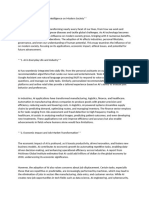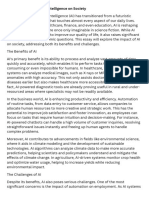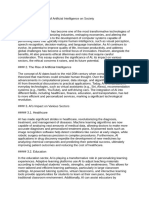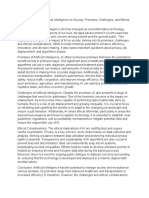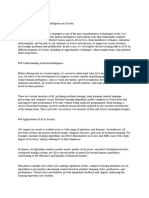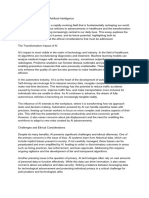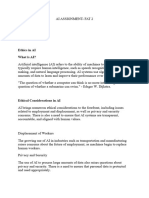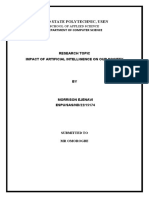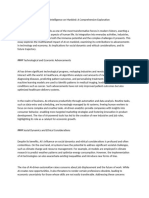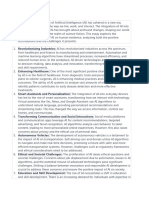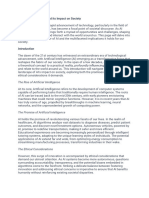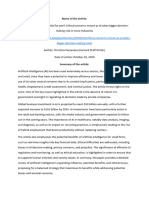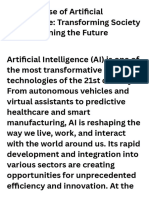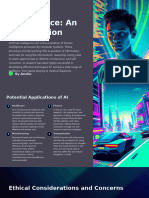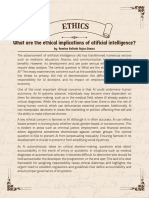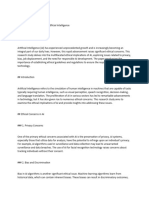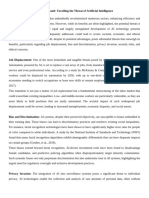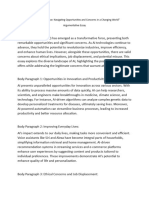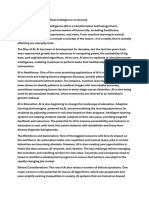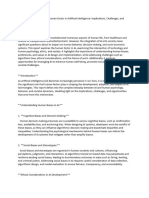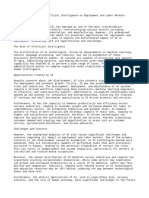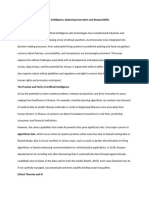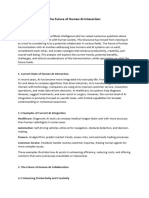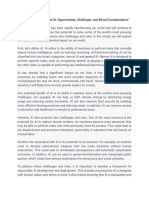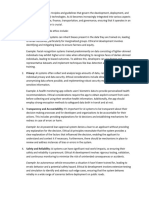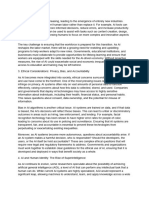0 ratings0% found this document useful (0 votes)
6 viewsAssignment 1
Assignment 1
Uploaded by
rizwanasghar97Copyright:
© All Rights Reserved
Available Formats
Download as DOCX, PDF, TXT or read online from Scribd
Assignment 1
Assignment 1
Uploaded by
rizwanasghar970 ratings0% found this document useful (0 votes)
6 views5 pagesCopyright
© © All Rights Reserved
Available Formats
DOCX, PDF, TXT or read online from Scribd
Share this document
Did you find this document useful?
Is this content inappropriate?
Copyright:
© All Rights Reserved
Available Formats
Download as DOCX, PDF, TXT or read online from Scribd
Download as docx, pdf, or txt
0 ratings0% found this document useful (0 votes)
6 views5 pagesAssignment 1
Assignment 1
Uploaded by
rizwanasghar97Copyright:
© All Rights Reserved
Available Formats
Download as DOCX, PDF, TXT or read online from Scribd
Download as docx, pdf, or txt
You are on page 1of 5
Zaid Arshad
Registration: L1F21ASCS0239
University Name: University of Central Punjab
Teacher Name: Sir Muttaraf
Title: Exploring Ethical Considerations in AI
**Artificial Intelligence: Transforming Society and Shaping the Future**
**Introduction**
Artificial Intelligence (AI) has emerged as a transformative force reshaping
various aspects of society and profoundly impacting human lives. As AI
technologies continue to advance rapidly, they hold immense potential to
revolutionize industries, improve efficiency, and address complex societal
challenges. However, the widespread adoption of AI also raises significant
ethical, social, and economic considerations that must be carefully
addressed. This essay explores the multifaceted nature of AI, its
applications, benefits, challenges, and the ethical implications associated
with its development and deployment.
**Understanding Artificial Intelligence**
At its core, AI refers to the ability of machines or computer systems to
perform tasks that typically require human intelligence. These tasks
encompass a wide range of activities, including problem-solving, decision-
making, natural language understanding, perception, and learning. AI
systems rely on algorithms, data, and computational power to simulate
human cognitive functions and achieve intelligent behavior.
**Applications of Artificial Intelligence**
AI technologies have found applications across various domains, driving
innovation and transformation in numerous industries. In healthcare, AI-
powered diagnostic tools and medical imaging systems enhance disease
detection accuracy and patient care outcomes. In finance, AI algorithms
analyze vast amounts of data to inform investment decisions, detect
fraud, and optimize trading strategies. In transportation, autonomous
vehicles leverage AI for navigation, route optimization, and collision
avoidance, promising safer and more efficient transportation systems.
Moreover, AI is revolutionizing customer service through chatbots and
virtual assistants, transforming education with personalized learning
experiences, and revolutionizing manufacturing with smart factories and
predictive maintenance. These diverse applications demonstrate the
pervasive influence of AI across different sectors and its potential to drive
economic growth and societal progress.
**Benefits of Artificial Intelligence**
The adoption of AI offers numerous benefits that can positively impact
individuals, organizations, and society as a whole. One of the key
advantages of AI is its ability to automate repetitive tasks and streamline
processes, leading to increased productivity and cost savings. AI-driven
insights derived from data analysis empower businesses to make informed
decisions, optimize operations, and gain a competitive edge in the market.
Additionally, AI technologies have the potential to address pressing global
challenges, such as climate change, healthcare access, and poverty
alleviation, through innovative solutions and predictive modeling.
Furthermore, AI enables personalized experiences and services tailored to
individual preferences and needs, enhancing customer satisfaction and
loyalty. In healthcare, AI-powered diagnostics and treatment planning
improve patient outcomes and contribute to the advancement of medical
research. In education, AI-based tutoring systems cater to students’
unique learning styles and pace, fostering better educational outcomes
and lifelong learning.
**Challenges and Ethical Implications**
Despite its transformative potential, the widespread adoption of AI
presents numerous challenges and ethical considerations that warrant
careful scrutiny. One of the primary concerns is the potential for bias and
discrimination in AI systems, stemming from biased training data or
algorithmic design. Biased AI algorithms can perpetuate existing social
inequalities, reinforce stereotypes, and marginalize vulnerable
populations. Addressing bias in AI requires proactive measures such as
diverse representation in data collection, transparency in algorithmic
decision-making, and ongoing monitoring and evaluation of AI systems.
Privacy and data protection are also significant ethical considerations in
the age of AI, as the proliferation of data-driven technologies raises
concerns about surveillance, data misuse, and breaches of privacy. AI
applications often rely on large datasets containing sensitive personal
information, raising questions about consent, data ownership, and
accountability. Regulatory frameworks and privacy-enhancing
technologies are essential for safeguarding individuals’ privacy rights and
ensuring responsible data stewardship in the AI ecosystem.
Moreover, the increasing automation of jobs and the potential
displacement of human workers by AI-driven technologies raise socio-
economic concerns about unemployment, income inequality, and
workforce reskilling. While AI has the potential to create new job
opportunities and drive economic growth, it also requires proactive
measures to mitigate its adverse impacts on employment and ensure
inclusive economic prosperity. Investments in education, training, and
workforce development are crucial for preparing individuals for the jobs of
the future and fostering a smooth transition to an AI-powered economy.
**Conclusion**
In conclusion, artificial intelligence represents a transformative force with
the power to reshape society, drive innovation, and address pressing
global challenges. However, the widespread adoption of AI must be
accompanied by careful consideration of its ethical, social, and economic
implications. By addressing issues such as bias, privacy, and workforce
displacement, we can harness the full potential of AI while safeguarding
human rights, promoting fairness, and fostering inclusive growth. As we
navigate the complex landscape of AI development and deployment,
collaboration between policymakers, technologists, ethicists, and
stakeholders is essential to ensure that AI benefits humanity and
contributes to a more equitable and sustainable
Ethical Considerations in Artificial IntelligenceIntroductionAs artificial
intelligence (AI) continues to advance and permeate various aspects of
society, ethical considerations surrounding its development and
deployment have become increasingly prominent. While AI holds great
promise in transforming industries and improving human lives, it also
raises complex ethical questions regarding fairness, accountability,
transparency, and the potential impact on individuals and society. This
essay explores the ethical challenges inherent in AI technologies and the
principles that should guide their responsible development and
use.Fairness and BiasOne of the foremost ethical concerns in AI is the
issue of fairness and bias in algorithmic decision-making. AI systems are
trained on large datasets that may reflect societal biases and inequalities,
leading to biased outcomes and discriminatory practices. For example,
biased AI algorithms used in hiring, lending, or criminal justice may
perpetuate existing social injustices and reinforce stereotypes. Ensuring
fairness in AI requires proactive measures to mitigate bias, promote
diversity and inclusion in data collection, and implement transparency and
accountability mechanisms in algorithmic decision-making
processes.Transparency and AccountabilityTransparency and
accountability are essential principles for fostering trust in AI systems and
ensuring responsible use. However, the complexity and opacity of AI
algorithms often make it challenging to understand how decisions are
made and to whom to attribute responsibility in case of errors or harm.
Ethical AI development entails promoting transparency by providing clear
explanations of AI decision-making processes, disclosing data sources and
algorithmic assumptions, and enabling external audits and oversight
mechanisms. Moreover, accountability frameworks should hold
developers, users, and stakeholders accountable for the ethical
implications of AI technologies and their societal impacts.Privacy and Data
ProtectionThe widespread adoption of AI relies on vast amounts of data,
including personal information, raising significant concerns about privacy
and data protection. AI systems may collect, analyze, and process
sensitive data without individuals’ knowledge or consent, posing risks to
privacy, autonomy, and individual rights. Ethical AI practices entail
respecting individuals’ privacy rights, obtaining informed consent for data
collection and processing, and implementing robust data protection
measures to safeguard against unauthorized access or misuse of personal
information. Moreover, data anonymization, encryption, and privacy-
preserving techniques can help mitigate privacy risks while enabling the
beneficial use of AI technologies.Societal Impact and InequalityAI has the
potential to exacerbate societal inequalities and widen existing disparities
if not deployed responsibly. The automation of jobs and the displacement
of human workers by AI-driven technologies raise concerns about
unemployment, income inequality, and access to economic opportunities.
Ethical considerations in AI development include assessing and addressing
the potential socio-economic impacts on marginalized communities,
ensuring equitable access to AI technologies, and fostering inclusive
growth that benefits all members of society. Additionally, AI should be
harnessed to address pressing social challenges, such as healthcare
access, education equity, and environmental sustainability, to promote
positive societal impact and contribute to the common good.ConclusionIn
conclusion, the ethical considerations surrounding artificial intelligence
are multifaceted and require careful attention to ensure that AI
technologies are developed and deployed in a manner that aligns with
ethical principles and values. By prioritizing fairness, transparency,
accountability, privacy, and societal impact, we can harness the
transformative potential of AI while mitigating its risks and maximizing its
benefits for individuals and society. Ethical AI requires a collaborative
effort involving policymakers, technologists, ethicists, and stakeholders to
establish guidelines, standards, and regulations that promote responsible
AI development and use. Ultimately, by upholding ethical principles in AI,
we can create a future where technology serves humanity’s best interests
and contributes to a more just, equitable, and sustainable world.
You might also like
- Hotsoft 8 Quick User GuideDocument36 pagesHotsoft 8 Quick User Guidefelysia_15No ratings yet
- Wall Panel SystemsDocument57 pagesWall Panel SystemsChrisel Dy100% (1)
- Reviews On Preliminary Report On The First Draft of The Recommendation On The Ethics of Artificial IntelligenceDocument4 pagesReviews On Preliminary Report On The First Draft of The Recommendation On The Ethics of Artificial IntelligencePratyusha MondalNo ratings yet
- The Influence of Artificial Intelligence on Modern SocietyDocument4 pagesThe Influence of Artificial Intelligence on Modern SocietyJames BolchoverNo ratings yet
- New Microsoft Word DocumentDocument2 pagesNew Microsoft Word Documentziak.alexander.gjabelNo ratings yet
- AI Revolutio SSDD NDocument3 pagesAI Revolutio SSDD NSamuel Ivan NganNo ratings yet
- Ethics Regards AIDocument2 pagesEthics Regards AIkristiancobaesNo ratings yet
- Unlocking Economic Potential - The Impact of AI InstitutionalizationDocument6 pagesUnlocking Economic Potential - The Impact of AI InstitutionalizationRachel BatraNo ratings yet
- The Impact of Artificial Intelligence on SocietyDocument3 pagesThe Impact of Artificial Intelligence on Society......No ratings yet
- The Ethics of Artificial IntelligenceDocument2 pagesThe Ethics of Artificial IntelligenceGalih PutraNo ratings yet
- The Ethics of Artificial Intelligence and Its Potential Impact On SocietyDocument1 pageThe Ethics of Artificial Intelligence and Its Potential Impact On Societychristiansumalpong422No ratings yet
- AiDocument3 pagesAiIbtehal IbrahimNo ratings yet
- The Impact of Artificial Intelligence On SocietyDocument2 pagesThe Impact of Artificial Intelligence On SocietychristineNo ratings yet
- The Ethical Implications of Artificial Intelligence in SocietyDocument2 pagesThe Ethical Implications of Artificial Intelligence in Societybe10253.19No ratings yet
- The Impact of Artificial Intelligence On SocietyDocument4 pagesThe Impact of Artificial Intelligence On Societybilos96573No ratings yet
- Essay On AIDocument2 pagesEssay On AIraghadabd436No ratings yet
- Avani Bhonde AI FAT 2Document29 pagesAvani Bhonde AI FAT 2avanibhonde27No ratings yet
- Artificial IntelligenceDocument12 pagesArtificial IntelligenceJohn Amazing100% (12)
- Impact of AI On SocietyDocument4 pagesImpact of AI On SocietyranaswarnadeepNo ratings yet
- The Ethical Implications of Artificial Intelligence in Daily LifeDocument2 pagesThe Ethical Implications of Artificial Intelligence in Daily Lifedragonguy6622No ratings yet
- The Influence of Artificial Intelligence On MankindDocument2 pagesThe Influence of Artificial Intelligence On Mankindoahtthao30908No ratings yet
- The Ethics of Artificial IntelligenceDocument2 pagesThe Ethics of Artificial IntelligenceNamNo ratings yet
- The Evolution of Human Existence - Life in The Era of Artificial IntelligenceDocument2 pagesThe Evolution of Human Existence - Life in The Era of Artificial IntelligencesujansanjayrjNo ratings yet
- Resume pdf-13Document1 pageResume pdf-13ittosaachiNo ratings yet
- The Future of Artificial IntelligenceDocument2 pagesThe Future of Artificial IntelligenceAreeha ZahidNo ratings yet
- Artificial Intelligence and Its Impact On SocietyDocument7 pagesArtificial Intelligence and Its Impact On SocietyLuni2213No ratings yet
- The Impact of Artificial Intelligence on Modern SocietyDocument2 pagesThe Impact of Artificial Intelligence on Modern Societymikaelanava90No ratings yet
- The Impact of Artificial Intelligence On SocietyDocument2 pagesThe Impact of Artificial Intelligence On Societyhokahel811No ratings yet
- 2Document1 page2⸻⸻⸻⸻⸻⸻⸻⸻⸻⸻⸻⸻⸻⸻⸻⸻⸻⸻⸻⸻⸻⸻⸻⸻⸻⸻⸻⸻⸻⸻⸻⸻⸻⸻⸻⸻No ratings yet
- The Humane Way of Using AIDocument3 pagesThe Humane Way of Using AIt2shiro7No ratings yet
- Business Ethics in Commerce - Individual AssignmentDocument4 pagesBusiness Ethics in Commerce - Individual Assignmentchess wizardNo ratings yet
- ### The Rise of Artificial Intelligence Transforming Society and Redefining The FutureDocument17 pages### The Rise of Artificial Intelligence Transforming Society and Redefining The Futuredevil 124No ratings yet
- The Ethics of Artificial Intelligence_ Balancing Innovation and ResponsibilityDocument3 pagesThe Ethics of Artificial Intelligence_ Balancing Innovation and Responsibilitydragonguy6622No ratings yet
- Ethics in Artificial IntelligenceDocument2 pagesEthics in Artificial Intelligencejolamo1122916No ratings yet
- Artificial Intelligence An IntroductionDocument5 pagesArtificial Intelligence An Introductionanshumanmeher21No ratings yet
- Ethics of Artificial IntelligenceDocument26 pagesEthics of Artificial Intelligencerazaalis916No ratings yet
- 4Document1 page4⸻⸻⸻⸻⸻⸻⸻⸻⸻⸻⸻⸻⸻⸻⸻⸻⸻⸻⸻⸻⸻⸻⸻⸻⸻⸻⸻⸻⸻⸻⸻⸻⸻⸻⸻⸻No ratings yet
- The Future of Artificial Intelligence - Opportunities and ChallengesDocument6 pagesThe Future of Artificial Intelligence - Opportunities and Challengeskgnmk1997No ratings yet
- Documento A4 Portada Trabajo Final de Carrera Recortes Aesthetic Handmade a Mano Formas GrisDocument2 pagesDocumento A4 Portada Trabajo Final de Carrera Recortes Aesthetic Handmade a Mano Formas Grisrojasromina179No ratings yet
- The Ethical Implications of Artificial IntelligenceDocument3 pagesThe Ethical Implications of Artificial Intelligencemarvin aquino100% (1)
- Introduction-WPS OfficeDocument6 pagesIntroduction-WPS Officehennessy abanillaNo ratings yet
- Artificial Intelligence Argumentative EssayDocument3 pagesArtificial Intelligence Argumentative EssayPrincess DelimaNo ratings yet
- Deployment of Artificial IntelligenceDocument4 pagesDeployment of Artificial Intelligencesobiarani948No ratings yet
- Navigating The AI Revolution: Ethics, Opportunities and ChallengesFrom EverandNavigating The AI Revolution: Ethics, Opportunities and ChallengesNo ratings yet
- PDF 1Document2 pagesPDF 1BorisNo ratings yet
- The Future Impact of Artificial Intelligence On SocietyDocument3 pagesThe Future Impact of Artificial Intelligence On SocietyLautaro de la Cal RuizNo ratings yet
- Human FactorsDocument3 pagesHuman FactorsAkshay SharmaNo ratings yet
- Formal Paper 2Document4 pagesFormal Paper 2tutorearnestNo ratings yet
- AI - Shaping Our Future TogetherDocument9 pagesAI - Shaping Our Future Togethersakibk464932No ratings yet
- The Impact Of Artificial Intelligence The Rise of the Machines:From EverandThe Impact Of Artificial Intelligence The Rise of the Machines:No ratings yet
- The Transformative Power of Artificial Intelligence in Modern SocietyDocument2 pagesThe Transformative Power of Artificial Intelligence in Modern SocietyfbcaubeNo ratings yet
- Artificial IntelligenceDocument2 pagesArtificial IntelligenceEnrik ShenepremteNo ratings yet
- Ai and Ethics PresentationDocument4 pagesAi and Ethics Presentationsilis99957No ratings yet
- The Impact of Artificial InteDocument2 pagesThe Impact of Artificial Intedheeraj.linkupNo ratings yet
- The Impacts of Artificial Intelligence On Employment and WorkforceDocument5 pagesThe Impacts of Artificial Intelligence On Employment and WorkforcemonsterNo ratings yet
- Ethical Challenges in Artificial IntelligenceDocument5 pagesEthical Challenges in Artificial Intelligencekamau samuelNo ratings yet
- Human-AI InteractionDocument4 pagesHuman-AI Interactionalbatross6598No ratings yet
- Navigating The Future of AI Opportunities, Challenges, and Ethical ConsiderationsDocument3 pagesNavigating The Future of AI Opportunities, Challenges, and Ethical ConsiderationsFauziNo ratings yet
- 4Document2 pages4Hüseyin Sezer YıldırımNo ratings yet
- AI EthicsDocument2 pagesAI Ethicschopradevyansh2010No ratings yet
- PDFDocument2 pagesPDFminju051606No ratings yet
- Sin Chew Newspaper IntroductionDocument2 pagesSin Chew Newspaper IntroductionFelicia TangNo ratings yet
- The 7 Key Components of A Perfect Elevator PitchDocument6 pagesThe 7 Key Components of A Perfect Elevator Pitchjamilkhann100% (1)
- Z450 Purlin Test ResultsDocument3 pagesZ450 Purlin Test ResultspnNo ratings yet
- Harvey D Labor Capital and Class Struggle Around The Built Environment in Advanced CapitalistDocument31 pagesHarvey D Labor Capital and Class Struggle Around The Built Environment in Advanced CapitalisthurdleNo ratings yet
- HandbookDocument30 pagesHandbookannqgbd201509No ratings yet
- How To Create A Winning Customer CultureDocument2 pagesHow To Create A Winning Customer CultureAlexandra DahlgrenNo ratings yet
- KIZAD - The Integrated Trade, Logistics and Industrial Hub of Abu Dhabi (Brochure)Document17 pagesKIZAD - The Integrated Trade, Logistics and Industrial Hub of Abu Dhabi (Brochure)Jaqueline SilvaNo ratings yet
- Kamal Hossain SarkarDocument2 pagesKamal Hossain Sarkaremailkamal01No ratings yet
- ENGLISH Potential Fraud and Suspicious Activity Flyer - InternationalDocument1 pageENGLISH Potential Fraud and Suspicious Activity Flyer - InternationalChristine Joy RiveraNo ratings yet
- Role of Accounting StandardsDocument10 pagesRole of Accounting StandardsMohd FaizanNo ratings yet
- 1Z0-068 - Oracle Database 12c: RAC and Grid Infrastructure AdministrationDocument5 pages1Z0-068 - Oracle Database 12c: RAC and Grid Infrastructure AdministrationBEPRASANNA@GMAIL.COMNo ratings yet
- Abbreviations 10 Class Social Telugu MediumDocument2 pagesAbbreviations 10 Class Social Telugu Mediumvmktpt83% (6)
- De Guzman VS CaDocument4 pagesDe Guzman VS CaAyahGael CayananNo ratings yet
- l.3 Session 2 - Find Your NicheDocument3 pagesl.3 Session 2 - Find Your NicheGabriella JasmineNo ratings yet
- Student Financial Statement: Enrolment and Financial Details For The SemesterDocument3 pagesStudent Financial Statement: Enrolment and Financial Details For The Semesterziyu haoNo ratings yet
- Slide 1: Company Name: Amazon Final Year Project (Presentation)Document4 pagesSlide 1: Company Name: Amazon Final Year Project (Presentation)Usama YousafNo ratings yet
- Mba-Marketing Principles Case Analysis-MotivationDocument3 pagesMba-Marketing Principles Case Analysis-MotivationMhild GandawaliNo ratings yet
- Architectural VisionDocument3 pagesArchitectural Visionajayagarwal29No ratings yet
- Betting WebsiteDocument2 pagesBetting WebsiteSales SoftlogiqueNo ratings yet
- Stand Up IndiaDocument19 pagesStand Up Indialaundromat360No ratings yet
- Fekadu Yehuwalashet Final ThesisDocument86 pagesFekadu Yehuwalashet Final Thesisbereket tesfayeNo ratings yet
- Market Anaysis-SoyamilkDocument7 pagesMarket Anaysis-SoyamilkVishnupriyaNo ratings yet
- Roll To Roll UV Embossing TechnologyDocument3 pagesRoll To Roll UV Embossing TechnologyCHANDER SHEKHAR JEENANo ratings yet
- Mohammad ShukriDocument5 pagesMohammad ShukriMohammed Shukri Al QudraNo ratings yet
- Fundamentals of Financial Accounting - (For Basic and INTERMEDIATE LEVEL) - Concepts and Applications - With Questions & Their SolutionsDocument10 pagesFundamentals of Financial Accounting - (For Basic and INTERMEDIATE LEVEL) - Concepts and Applications - With Questions & Their SolutionsgreenwellNo ratings yet
- Banco de Preguntas Práctica Calificada 2 Elementary Business EnglishDocument11 pagesBanco de Preguntas Práctica Calificada 2 Elementary Business EnglishAraceli Maryori Calderon PonceNo ratings yet
- Letter of Transmittal Research Paper SampleDocument5 pagesLetter of Transmittal Research Paper Samplezqbyvtukg100% (1)
- THE REGULATION OF DIGITAL ASSETS IN NIGERIA-SSRN-id4655847Document113 pagesTHE REGULATION OF DIGITAL ASSETS IN NIGERIA-SSRN-id4655847Adi NouashcinciNo ratings yet



